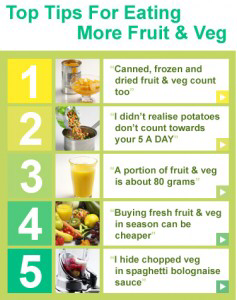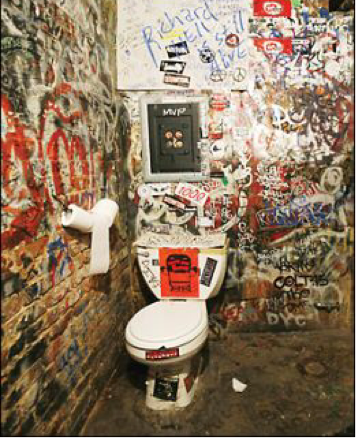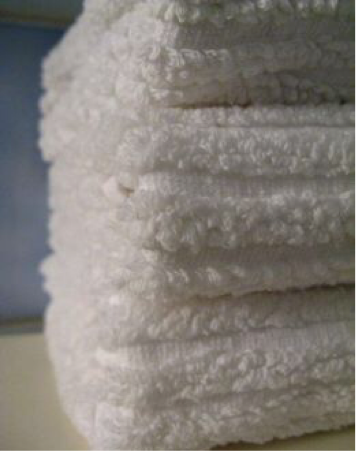|
In early 2014 we were all told that eating at least 'seven-a-day', rather than five portions, of fruits and vegetables is the secret to good health. However many people struggle to fit in five portions let alone seven!
Fast forward to February 23, 2017, and that advice has been amended to 10-portions-a-day! Assuming the advice is good can you afford to follow it as the price of some fruit and vegetables rockets and there is a shortage in some cases? A portion however may be nothing more than a handful of blueberries or half a dozen strawberries. Can you afford to ignore good advice? While the advice may be well intentioned and sound it will not be easy to follow. The price of fruit and veg in the U.K. is sky high. Some produce bought from supermarkets is past its best at point of sale and quickly inedible. If money is tight, and even if it is not, throwing food away untouched will be galling. Again it proves the government and researchers are out of touch with the lives of many British people. Here is some advice as to what you can do to improve your fruit and veg intake: Grow your own -- No matter whether you have a garden or not it is possible to grow some produce. It may not always be cheap but it does not have to be expensive. Start seeds off in old card egg boxes, or empty, clean yogurt pots, so individual seedlings are easy to pot on. You can grow tomatoes in hanging baskets and tubs so be inventive. An old bucket can act as a big plant pot. Radishes grow very quickly and careful planting can mean you have a ready crop throughout summer. Select crops that you know your family will want to consume. Compost -- If any fruit or veg does begin to turn before you can consume it, use it rather than just binning it. Small composters are a great way to dispose of dead flowers, fruit, veg, peelings, egg shells, paper and old tea-bags but not cooked or raw food. Plant potatoes gone to seed -- If potatoes begin to sprout before you can eat them plant them for an almost cost free crop of spuds. They will not count toward your seven-a-day but will save you money and enable you to buy fresh fruit and veg. Frozen -- Frozen fruit and vegetables apparently do not count towards your daily quota. These days quick time freezing does however ensure some goodness is retained. In winter buy products such as tubs of frozen summer fruits which can be quickly stewed ready to add to breakfast cereal or use in other ways. Windfall -- Windfall apples can be used once stewed. But what about free foods such as brambles, or blackberries? You can still find plenty growing wild and ready for you to pick in late summer come early august. Perfect for making jam, freezing or just eating straight away. Cooking -- As consumers become lazy and use pre-cooked ready meals the art of simple cooking is forgotten. However it is cheaper in many cases to cook your own, with selective cooking and shopping. Research -- Research best prices and shop around. Research recipes at your local library or online. Choose ones that will offer good value for money but also retain the nutrients of fruit and veg used. Diversify -- Variety is the spice of life. If your usual choice of veg has gone up in price or is not available try an alternative. You may be surprised how tasty some fruit and veg really is. Get an allotment Finally -- Never get too bogged down with the latest health advice. We are all individuals and our genes play a part in our health. What may be great today could be dismissed tomorrow. It is however worth following a sensible diet and we all know fruit and vegetables have a wealth of benefits. Good health though is often also about lifestyle and exercise so make other changes including quitting smoking. Whether G.M.O. fruit and veg offer the same positive health benefits is unclear. Always ensure you thoroughly wash fresh fruit and veg, especially if not home grown, to remove any potential insecticide residue. BBC News 2014 "A study of 65,226 men and women indicated the more fruit and vegetables people ate, the less likely they were to die - at any given age. Seven a day cut the risk of dying from cancer and heart disease. But the government says its "five-a-day" advice is sufficient and that many of us struggle to achieve even this. Fruit and veg: For a longer life eat 10-a-day 10 ways to hit your 10-a-day, with minimum effort
1 Comment
Working in a hospital pre-retirement, albeit in an administration role, certainly made me pay attention to good hygiene practices.
Did you know though that, however clean you may think your bathroom is, it could be a veritable minefield of germs and bacteria? There are a few obvious, and some not so obvious, ways that your bathroom may be germ-filled. Of course first and foremost good regular cleaning is essential. I hold my hands up to having peaks and troughs as far as home cleaning goes these days tough. After all there are so many other demands on our time. Hopefully this will act as a gentle reminder to us all about the potential hazards in our bathrooms and toilets, and just how we can minimise them. Shut that lid Let's start with one of the most important things to do in your bathroom. ALWAYS close the toilet lid before you flush. Did you know that, as you flush, your toilet can spray a fine mist of faecal matter for quite a distance. If you have your toothbrushes placed within six feet of the toilet bowl there is a fair chance that they will be covered. So, instead of cleaning your teeth you could actually be brushing them with a mixture of toothpaste and poo. Yuk. The importance of regular wipe downs Toilet handles, light switches. taps or faucets, toilet seats or what you will are regularly touched with unwashed hands. Of course, a few germs keep our bodies on their toes and are necessary. It is probably fair to say though that, most bathrooms would not pass rigorous hygiene testing. Faucets, taps, handles, switches and the like will more often than not have germs and bacteria present. Some may even have E Coli which can be a serious health risk. Keep some anti-bacterial wipes in the bathroom, so that you can have a quick wipe down regularly, apart from your proper cleaning. Remember that often a bar of used soap carries the most germs! Location, location Give some thought about where you are going to place toothbrushes, sponges, hand-wash, towels and the like. Apart from the spray from the toilet bowl there may be some spray from the shower. This does depend on if you have a shower cubicle or perhaps just a shower curtain. If, like me, you have a pocket sized bathroom it may not be easy but a small set of bathroom drawers could be used to house items rather than leave them on display. Shower heads need to be cleaned Guilty. I do not clean my shower-head enough but here is why you should. If you live in a hard water area the odds are the shower head will be full of limescale. This reduces its performance. It also can mean that you are spraying yourself with gunge, mold or even, yes you've guessed it, faecal matter. Shower curtains, cubicles, tiles, screens and the like need cleaning alsoIt is just as important to clean items such as shower screens. These will often house the remnants of the previous person's shower which does not make for a good companion to your ablutions. Clean regularly to extend their longevity but also to remove germs, scum and limescale. Towels, sponges and flannelsAs you jump out of your shower, all fresh and sweet smelling, you grab that soft fluffy clean towel or do you? Unless towels, flannels and sponges are regularly washed, and kept personal, you may be rubbing germs onto yourself. There may even be that faecal matter again.What a thought. Exercise caution with your cleaning productsThese days there are many aids to cleaning and good hygiene. Some are merely cosmetic whilst others claim to kill the worst bacteria and germs. Always read the label of such products before you buy. Personally I find that some are too lethal to have around the home. A child or animal could easily suffer if you are not careful. Store such items out of reach and harm's way. You may even have an allergy or risk skin damage by using a particular product, so be sensible. The most care needs to be taken when mixing such products. Guilty again. Many people now have a toilet block or gel in their toilet bowl which activates with each flush. Bleach or toilet cleaner is still usually added to the bowl on a regular basis. In fact many different products may be added. If you are not careful this practice could cause a noxious gas or your toilet bowl to catch fire and, or, explode. I am no chemist and yet regularly I mix a lethal cocktail of chemicals in my loo. Yes I want a clean and hygienic toilet but not if I am going to gas myself! Finally Do what you can to keep your bathroom and toilet clean, protect yourself and your health but keep a sense of proportion. I guess it is fair to say that despite your best efforts some bacteria and germs will survive. That's life I'm afraid. Just make sure that they do not have a pleasant breeding ground to multiply. |
Archives
March 2020
Categories
All
|










 RSS Feed
RSS Feed




